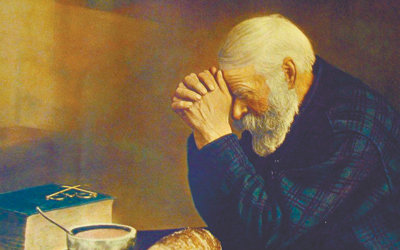
Luke 1:46-49 "And Mary said: “My soul exalts the Lord, 47 And my spirit has rejoiced in God my Savior. 48 “For He has had regard for the humble state of His bondslave; For behold, from this time on all generations will count me blessed. 49 “For the Mighty One has done great things for me; And holy is His name."
Introduction:
In today's post we want to consider how the Holy Spirit operated as the Spirit of prophecy in the Christmas narrative of Luke's Gospel. Revelation 19:10 explicitly refers to the Holy Spirit by this title: Then I fell at his feet to worship him. But he said to me, “Do not do that; I am a fellow servant of yours and your brethren who hold the testimony of Jesus; worship God. For the testimony of Jesus is the spirit of prophecy.”
It seems appropriate to capitalize "spirit", since in the Greek text the word for "spirit" has the definite article "the". The 1599 Geneva Bible follows this pattern: "And I fell before his feet, to worship him, but he said unto me, See thou do it not: I am thy fellow servant, and one of thy brethren, which have the testimony of Jesus, Worship God: for the testimony of Jesus is the Spirit of prophecy."
The Person and work of the Holy Spirit in the Advent or first coming of Jesus Christ is a remarkable study. Luke mentions the Holy Spirit more often than any other Biblical writer in both his Gospel and Acts of the Apostles (some 50 times or so). Understanding the Holy Spirit's prophetic ministry aids to grasp the preparation for the incarnation of the Son of God. An immediate life-practical application is our need to be ready for Christ's second coming. Certainly, reception of what the Bible reveals about Jesus is made possible by the Holy Spirit.
Before we move on, a question must be answered: what is prophecy? Prophecy exhorts God's people to be alert and ready. Prophecy reminds the Christ-follower of their true identity in Him. It urges us to action - no reaction. Prophecy speaks to the present - pointing us to what lies ahead. Prophecy reminds us from whence we came and to not repeat the mistakes of past generations of God's people. H.A Ironside once noted that prophecy is "pre-history", meaning that it describes events and persons before such comes to pass. The Holy Spirit is the chief agent behind all prophetic declarations in the Bible.
The main thought of today's post
Truly then, the Holy Spirit is the "Spirit of Christmas". This post will aim to briefly explore how the Holy Spirit prepared Old Testament believers and history for Christ’s first coming. The Spirit of prophecy points to Christ. There is much application for our lives in considering these precious truths.
1. Promises to God’s people.
Luke 1:67-80
There are a total of five prophetic songs in Luke 1-2. The second of these is that by John the Baptist's father - Zacharias. Luke 1:67 explicitly describes his response to John the Baptist's birth: "And his father Zacharias was filled with the Holy Spirit, and prophesied, saying." Now we don't have the time to lay out the full meaning of this incredible prophetic utterance. However, a brief outline and some general remarks can serve to show how Zacharias saw John' the Baptist's birth is relating to God's promises to His people.
a. God's promise of a king. 1:67-71
b. God's promise of a blessing. 1:72-75
c. God's promise of a people. 1:76-79
John the Baptist was chosen by God to be the forerunner of the Messiah. Even from birth, the call of God was uttered by his father in this prophetic utterance. The Spirit of prophecy was rehearsing through Zacharias God's covenants to David (2 Samuel 7:13-16), Abraham (Genesis 12:1-7) and all the people of God (Exodus 19:1-6; 1 Peter 2:1-12). This prophecy was given to connect John the Baptist to what would be the One He would announce about to other people.
God's promises comprise the first component of what we could term: "the drive-train of prophecy. Just as a car as a drive-train (a motor, a transmission to convert power from the motor to the wheels), so too does the Spirit of prophecy take God's purposes of eternity and bring them to bear in the lives of His people in time. Promises preserve God's people (2 Peter 1:3-4). God's promises point to His character as the God that cannot lie (Hebrews 6:18-20; Titus 1:2).
So clearly, in Zacharias' prophetic song, we see the Spirit of prophecy calling to mind the promises of God. The Latin title for Luke 1:68-79 is "benedictus", meaning "blessing". Truly to know that God had kept all those promises made to His people from one generation to the next ought to speak volumes to us today.
2. Person of Christ. Luke 1-2
We had mentioned earlier a "drive-train" of prophecy with which the Holy Spirit uses to convey the prophecies of Christmas - or any prophecy for that matter. The basis is God's promises. The focal point is the Person of the Lord Jesus Christ. The most famous song of the five songs recorded in Luke's Gospel is what is termed: "The Magnificat" in Luke 1:46-55. This title is due to the first word of the song, "magnificat" or "exalts". The purpose of Mary's song is to call attention to the One who now resides in her womb. Like Zacharias' song, we will only give an outline of the contents of what Mary exclaims as she visits her cousin Elizabeth. In other words, what is there about Mary's song that points to the Person of Jesus?
a. Mighty Savior. Luke 1:46-49
b. Merciful Lord. Luke 1:50-56
This little outline doesn't come close to doing justice to the richness of what the Holy Spirit is saying through Mary. Mary sees the events of both John's pending birth and the miraculous conception of the Christ-child in her womb as a fulfillment of God's promises to His people concerning a Deliverer. In Luke 1:50 we find Mary quoting from Psalm 103:17, a psalm that rehearses God's work on behalf of His people Israel. The Old Testament saint looked forward to the time when Messiah would come. Mary was as close to that as anyone could be: she was carrying in her womb the God-man!
Several places in the New Testament remind us of the fact that the Holy Spirit, by way of prophecy, points to the Person of Christ (Luke 24:44; 1 Corinthians 10:1-4; 1 Peter 1:10-12; 2 Peter 1:20-21). The Holy Spirit's task is to point anyone and everyone to Jesus Christ - the great Savior and great Lord (see John 16:8-12).
3. Purposes of salvation. Luke 2:25-35
We have noted how the Spirit of prophecy utilizes the promises of God to point to the Person of Christ. As we look at one more prophecy in Luke today, we consider briefly the words of a man by the name of Simeon. By this point in the narrative, Jesus has been born. Simeon is described as having waited for the time when He would behold Israel's deliverer with His own eyes. Older generations of the past assigned a Latin title to Simeon's prophetic declaration in Luke 2:29-32, namely: "nunc dimittis". This Latin phrase corresponds to the first two words we can translate as: "now release".
Think of how God's salvation purposes release those who receive such by faith. Release from guilt (Romans 5:1). Release from the penalty of sin (Ephesians 1:7). Release from alienation from God (1 Peter 1:18). Release from future judgment (1 Thessalonians 1:10). Release from Satan's tyranny (Hebrews 2:14; 1 John 3:8). Release from the sting of death (1 Corinthians 15:55-57). Simeon is expressing how beholding the Savior has set Him free. The purposes of salvation are concentrated in a Person - a Divine Person conjoined to a truly human nature.
Simeon's words, though glorious, also contain a tone of warning to Mary and Joseph. In Luke 2:35 we read - "and a sword will pierce even your own soul—to the end that thoughts from many hearts may be revealed.” The word translated "pierce" speaks of an object passing through something from one end to the other (such as Young's Literal Translation: "and also thine own soul shall a sword pass through."
What possible event could Simeon be talking about? The only place where all of God's purposes are fulfilled - the cross. Jesus was there. Mary was there. John 19:25-27 records the pain of Mary's soul:
"Therefore the soldiers did these things.
But standing by the cross of Jesus were His mother, and His mother’s sister, Mary the wife of Clopas, and Mary Magdalene. 26 When Jesus then saw His mother, and the disciple whom He loved standing nearby, He *said to His mother, “Woman, behold, your son!” 27 Then He said to the disciple, “Behold, your mother!” From that hour the disciple took her into his own household."
The shadow of Calvary stretched all the way back to Bethlehem's cradle. The Christ-child held in Simeon's arms would be the man with nail-pierced hands stretching out his arms. The one who carried Him in her womb for nine months would look to Him that would secure her faith for eternity. God's purposes of salvation found their place at the cross, their Person - Jesus Christ and their foundation - the promises of God.
The Spirit of prophecy spoke through these events and people. Luke's record captures the wondrous reality of the Holy Spirit's work in making clear the advent of the Son of God in frail humanity. Would we, this advent season, heed His voice.










